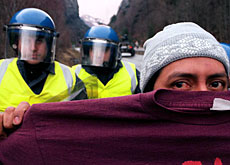
Alternative Davos opens with criticism of US

Former German finance minister, Oskar Lafontaine, has attacked a possible invasion of Iraq, as a series of rival gatherings to the World Economic Forum's annual meeting got underway in Davos.
They have been organised by anti-globalisation campaigners to coincide with the WEF summit in the Swiss mountain resort.
Opening the “Public Eye on Davos”, Lafontaine said that a war with Iraq would be a “terrorist act” and that it would intensify hatred toward the United States.
His speech included strong criticism of the US and its policies on the environment and industry, a key theme on the anti-globalisation agenda.
Public Eye
A number of NGOs are attending the “Public Eye on Davos” conference, organised by the Berne Declaration, which specialises in development issues.
The Public Eye on Davos – set up by NGOs to monitor the activities of the WEF and its participants – wants to see binding international rules introduced, requiring multinationals to sign up to agreed environmental and social standards.
“The idea is to launch a convention on corporate accountability and responsibility,” Miriam Behrens of Pro-Natura, the Swiss arm of Friends of the Earth, told swissinfo.
“We promoted the idea at Johannesburg [during the Earth Summit] with some success, and we believe that heads of state present at WEF could use the summit as a platform to continue the discussion.”
Behrens says voluntary commitment is not enough and the only way to make multinational corporations accountable is to make them sign up to a UN convention.
Focusing on business
When the Public Eye started in 2000 its focus was on the WEF as an institution. But the attention this year has shifted to the corporate members attending the forum – CEOs and bosses of major multinationals.
“It is not so important what leaders talk about during the five days of the forum or the promises they make,” Matthias Herfeldt of the Berne Declaration – one of the Public Eye organisers – told swissinfo.
“What matters is whether they change their corporate activities throughout the year, and as we have not seen much of that up until now, we continue to blame them for their irresponsible behaviour.”
Herfeldt is also sceptical about how dedicated the WEF is to the theme of this year’s summit “Building trust”. He is concerned that corporations are using Davos as a public relations exercise to show how responsible they would like to be in the future – without any real commitment.
“They used other political platforms, such as Johannesburg, to lobby harshly against binding rules on an international level,” he said.
“They are the main beneficiaries of globalisation, yet they constantly fail to live up to their social and environmental responsibilities.”
Open Forum
Critics have accused the WEF of being a private club for the world’s foremost corporations.
Even though NGOs have been invited in recent years to take part in the summit –
this year the International Committee of the Red Cross and the Max Haavelaar Foundation for free trade is attending – they make up only a small percentage of participants.
And they have complained of finding themselves sidelined from the most important discussions.
Yet both Herfeldt and Behrens feel that the Public Eye has had an impact on the WEF over the years.
This year sees the inclusion – for the first time – of an Open Forum. It is an independent platform that will address, among other things, corporate accountability – the very issue the Public Eye is highlighting.
“It is proof that the WEF is opening up to criticism and trying to integrate it as much as possible,” said Behrens. “And that is a result of the pressure we have put on them – they feel forced to do it.”
Demonstrations
The Public Eye conference is open to the public and is due to include panel discussions between invited corporate CEOs and representatives from developing countries of those directly affected by their activities.
No debates have been scheduled for Saturday 25 – the day when a large number of anti-globalisation protestors are due to take part in an official demonstration in Davos.
But the Public Eye organisers deny that they are officially encouraging people to demonstrate.
“We have not signed any call for the demonstration,” said Herfeldt. “But of course we support the right of freedom of expression.
“We are aware that the whole of the media attention will be on the demonstration on Saturday and therefore it did not make sense to organise a conference session at the same time.”
Other Davos
Some of the more radical members of the anti-globalisation movement and a number of non-governmental organisations are participating in the alternative summit, known as the “Other Davos”.
The forum first took place in January 1999 and was organised by Attac Switzerland.
The organisers argue that by denying them the chance to participate in the Davos meeting proper, the WEF has shown it is not interested in holding a dialogue with them.
In previous years, the Other Davos has attracted more than 1,000 people and around 50 organisations. Now in its fourth year, the alternative forum hopes to continue the fight against globalisation.
swissinfo, Jonathan Summerton

In compliance with the JTI standards
More: SWI swissinfo.ch certified by the Journalism Trust Initiative




























You can find an overview of ongoing debates with our journalists here . Please join us!
If you want to start a conversation about a topic raised in this article or want to report factual errors, email us at english@swissinfo.ch.